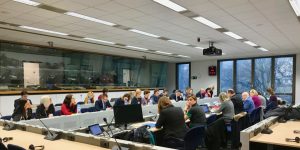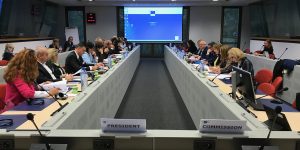Banja Luka, 9 February 2017
Representatives of the European Commission (Commission) and Bosnia and Herzegovina (BiH) met in Banja Luka on 9 February 2017 to discuss the level of implementation of the SAA and approximation of the country legislation to the EU acquis in the field of innovation, information society and social policy. The meeting was co-chaired for the EU by Mr Georg Ziegler, Deputy Head of Unit for Albania and Bosnia and Herzegovina, Directorate General for Neighbourhood and Enlargement Negotiations (DG NEAR – D4) of the European Commission, and for Bosnia and Herzegovina by Mr Adnan Husić, Assistant Minister from the BiH Ministry of Civil Affairs.
During the meeting, developments in the area of information society and media were discussed, including overall strategic and institutional developments in the field of information society and ICT. The backsliding in this area, remarked in the 2016 Commission report on BiH, remains to be addressed. Against the background of the dramatic financial situation of the BHRT, the Commission urged BiH with no further delays to adopt and implement an adequate fee collection model to ensure the financial sustainability and political independence of the Public Broadcasting System and to establish the Public Services Broadcasting Corporation as joint body for all three Public Broadcasters as provided for in the law. Furthermore, BiH was asked to complete the digital switchover and to secure the political, financial and operational independence of the Communication Regulatory Agency (CRA), as well as to introduce the emergency number 112 throughout the country.
In the area of education and training, the Commission welcomed the adoption of the Strategic Priorities for Higher Education 2016-2026 and urged BiH to complete the domestic legislative and strategic framework, ensuring the necessary harmonisation between state-level, entity and cantonal legislation. The Commission also encouraged BiH to implement the outcome-based common core curriculum, to improve the cooperation between ministerial stakeholders and between state- and entity-level accreditation agencies, to implement the action plan for a baseline qualification framework, to introduce entrepreneurial learning and to establish national education statistics. The EU also welcomed the good participation rate of BiH in the Erasmus+ programme and commended the good work of the Erasmus+ office and the Creative Europe desk with its offices in Sarajevo and Banja Luka. The Commission welcomed BiH’s participation in founding the Regional Youth Cooperation Office in Tirana and asked to accelerate the ratification process for the respective agreement.
With regards to employment and social policies, the strategic framework and institutional capacities were discussed, including implementation of Employment Action Plans and the development of skills based on labour market needs. The Commission urged BiH to step up efforts in developing and implementing active labour market policies and to adopt a country-wide sector strategy on employment as a precondition for accessing EU sectoral budget support. The Commission noted the need to establish a system of coordination of social security schemes within BiH as first step before preparing for the EU-wide coordination system. It also called on BiH authorities to improve and better implement social protection and social inclusion policies particularly for disadvantaged people, such as persons with disabilities and the elderly. The Commission also encouraged the BiH authorities to step up their engagement in social dialogue. While welcoming some progress in the implementation of the Roma Strategy action plan the Commission stressed the need for improve access to healthcare and employment for Roma.
The country’s investment in research and innovation remains low. The Commission encouraged BiH to improve the administrative capacities and coordination that would enable it to fully benefit from available EU programmes in this area, specifically via an increased participation in Horizon 2020. Research Infrastructure actions were identified as an area of immediate high potential for BiH to engage more actively in. The Commission encouraged BiH to develop an ERA Action Plan and adopt the BiH Strategy on Research 2016-2021.



